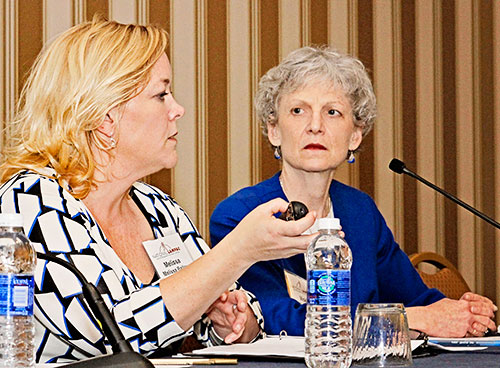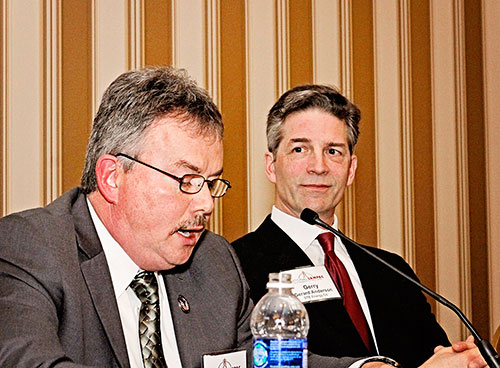The eighth annual gathering of IBEW leadership and investor-owned utility executives drew nearly 200 attendees from across the country to Washington, D.C. March 17.
The eight annual gathering of IBEW leadership and investor-owned utility executives drew nearly 200 attendees from across the country to Washington, D.C. March 17.
The meeting was hosted by the Labor and Management Political Action Committee, a joint venture of the IBEW and the Edison Electric Institute, the national association of investor-owned utilities.
LAMPAC creates opportunities for parties that usually face off against one another to instead focus on areas of common interest. Tuesday’s meeting mixed presentations highlighting successful collaborations with plenty of time for less formal conversation.
“LAMPAC is rare and valuable, and I think the responsibility level of people in the room is testament to that,” said Utility Department Director Jim Hunter. “Everyone in this room understands that it is not nearly enough if we only talk to each other across negotiating tables.”
 |
| Utility industry attorney Melissa Bailey is and Victoria Bor, an attorney who represents the IBEW, spoke about their joint negotiation with OSHA about new safety standards. |
One panel brought together the lawyers -- one for the utilities, one for the IBEW -- who collaborated in negotiations with the Occupational Safety and Hazard Administration over new federal safety standards.
“It was a cooperative and cordial partnership,” said Melissa Bailey, the attorney who represented the utilities. “We ended up in a place that is beneficial to everyone.”
The heart of the meeting, however, was a panel discussion about the experience of the 2,000 Detroit Local 17 members at DTE Energy. Local 17 Business Manager Dean Bradley was joined onstage by DTE’s Chairman and CEO Gerard Anderson.
“Eight years ago our company was mediocre lot of ways and we were worse than mediocre in the engagement of our people,” Anderson said. “It began to dawn on me that maybe not having our people’s heads and hearts connected to the business was the root cause of the rest of our problems.”
Then came the downturn, Detroit’s economy collapsed and DTE faced a loss of nearly $200 million in revenue.
“The first thought was that we may need a really big layoff here, but we decided to do the opposite and bet on our people,” Anderson said. “We told them ‘We can’t promise you anything but we don’t want to lay people off and we need you now.’”
Anderson and Bradley described how they came together to make their workers’ jobs better. The result they both said was a renewed focus on safety, on job quality and productivity that survived the crisis.
“I have no illusions about our challenges and disagreements, but I want our members to love their jobs,” Bradley said.
 |
| Detroit Local 17 Business Manager Dean Bradley was joined onstage at the LAMPAC meeting by DTE’s Chairman and CEO Gerard Anderson to speak about their positive collaboration. |
Now at DTE, three labor-management committees meet regularly, one including the Anderson and Bradley. They developed an emphasis on peer-to-peer safety enforcement and massively increased training. They also implemented the IBEW’s Code of Excellence program, which Anderson said was a natural complement of the company’s efforts.
“[The Code of Excellence] identifies that the future health of unions is by building a workforce that embodies excellence, and I really commend the union for having that forward looking mindset,” Anderson said. “I think it will lead to positive results for you and your members.”
Bradley said the membership is now better trained, more flexible and happier. The number of grievances filed is now down to three in a 450 person unit, a number Bradley called astonishing. The results for DTE have been equally good: customer satisfaction, revenue, dividends are all up and outage times are down.
“I attribute all of this success to the shift in energy of our workforce,” Anderson said. “I can see it. They smile more.”
The responsibilities of the people who spoke at LAMPAC was a testament to the importance of its mission. One of the five commissioners of the Federal Energy Regulatory Commission spoke about the challenges of expanding and repairing the grid. Rep. David McKinley, a Republican congressman from West Virginia, skipped a vote to speak at LAMPAC about the need for labor and industry to throw their combined weight into the anemic national conversation about energy.
“We need more meetings like this,” he said. “We need to find ways to come together and build bridges in this country, and I believe one of the only ways to do that right now is around energy policy.”
Huntington, W.Va., Local 317 Assistant Business Manager Shane Wolfe came eager to listen and learn, but without a specific issue in mind that he hoped would be addressed.
“There are people whose names you always see but never the person. This is a good place to make that connection,” Wolfe said. “It’s a way to send a message that we do more than just send them workers. Where we can find common cause, we should.”
Realated Story:
Utility Companies Recruit Wiremen for Emergency Response Teams